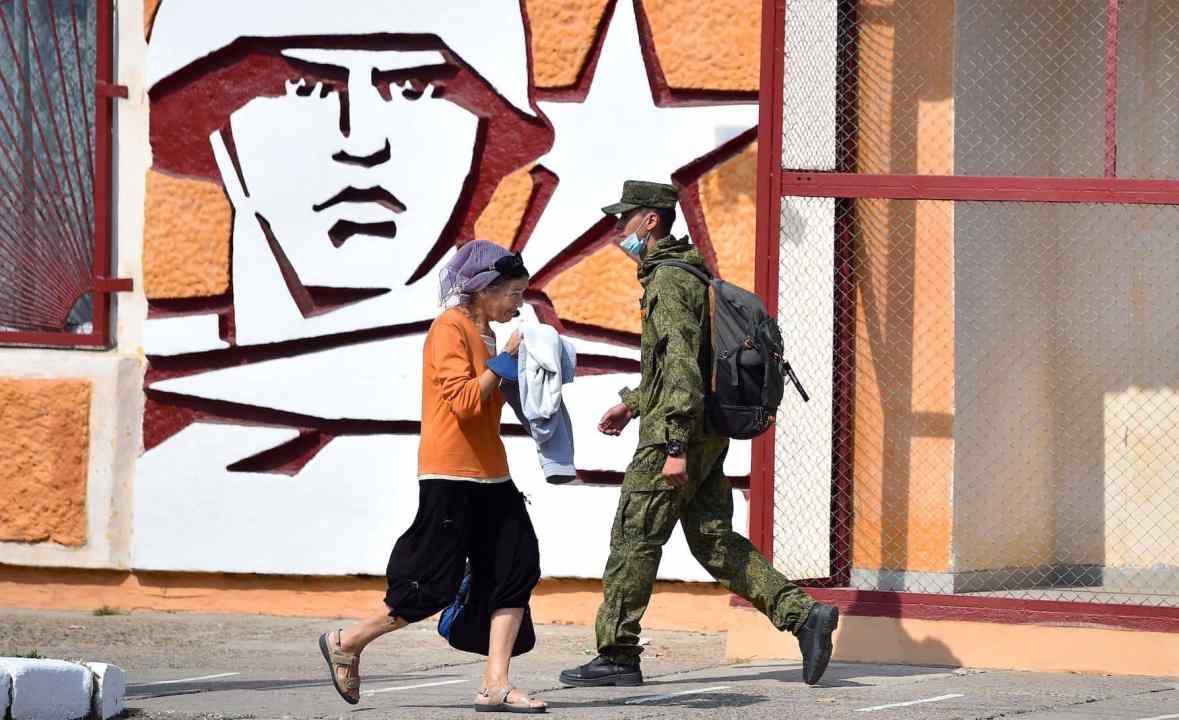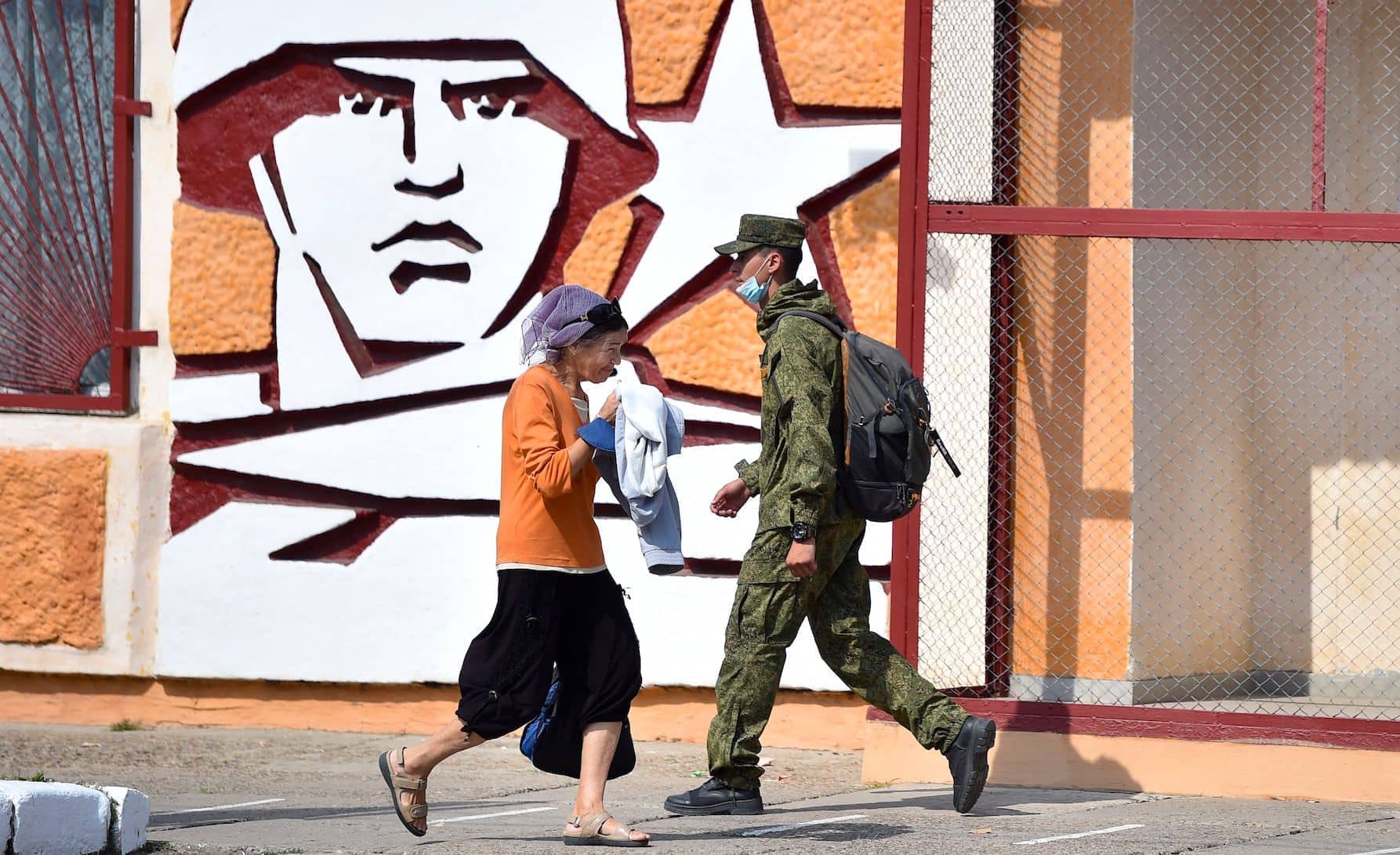Chișinău, Moldova
Armed soldiers patrol the checkpoints along the road into Transnistria, standing guard under a giant Soviet hammer and sickle flag. International law dictates that this thin tract of land along the border with Ukraine is part of Moldova. Yet it feels not just like a different country, but a different decade altogether.
Held by Russian-backed separatists since the fall of communism, the region is locked in a bygone era, with its estimated 350,000 residents going about their lives in the shadow of Soviet-era concrete buildings and statues of Lenin. Around 1,500 Russian troops have been stationed here as part of a ‘peacekeeping mission’ since a brief war in the early 1990s, operating alongside the unrecognised region’s own conscript army.
Together, they prop up the breakaway administration despite orders from Moldova and the UN to leave. Military bases kitted out with heavy armour and helicopters dot the landscape, while Russian personnel keep a careful watch over the highly-classified Cobasna ammunition depot, where thousands of tonnes of Soviet weaponry are believed to be stored.
In recent weeks, the self-declared Pridnestrovian Republic, as the Transnistrian authorities call themselves, has repeatedly claimed it has come under attack from mysterious terrorist groups, reporting explosions at government buildings and supposedly shooting down drones laden with explosives. While no group has claimed responsibility, local officials have pointed the finger eastwards towards Ukraine, producing ‘evidence’ of what appears to be western-made missile launchers littering nearby streets. Authorities in Moldova’s capital, Chișinău, fear that they are part of a false flag ploy to open up another front in Moscow’s stalled offensive.
One Russian general recently said that his forces planned to take Odessa in an effort to open up a land bridge between Crimea and their bases in Transnistria. This would effectively cut off Ukraine from the coast and give Moscow a chance to resupply its troops from Cobasna. In practice though, Ukraine’s defenders have dug in and blocked the advancing army, leaving Putin’s top brass to fire off rockets at the city in frustration. But Transnistria is still a threat, and the prospect of strikes across the frontier has forced Kyiv to hold back troops from the main fight to contain Russian forces in the region.
The disputed territory doesn’t just pose problems for Ukraine, however. Many Moldovans were fearful that Victory Day on 9 May would bring a sharp escalation in hostilities, particularly as Moscow also accuses them of ‘discrimination’ against Russian speakers in Transnistria. While the anniversary of Nazi Germany’s defeat went ahead in Chișinău, they did so with a heavy police presence. More than a hundred fines were handed out to those wearing ‘pro-war’ symbols such as the now-infamous ‘Z’ logo or the orange and black St George’s ribbon.
While Moldova has declared it will stay neutral in the war and has declined to sanction Russian businesses, Chișinău has sought support from the EU to shore up its defences against Russian troops. At the same time, the government filed an application to join the EU a few weeks ago and many are calling for closer integration with the West.
On paper, the risk of an outright military conflict looks slim. With Ukraine controlling its airspace and shooting down enemy planes, Moscow cannot reinforce its garrisons and doesn’t have enough men to carry out an invasion. But, according to Viorel Cibotaru, who served as the country’s defence minister until 2015, Transnistria is at the centre of a campaign of Russian influence designed to prevent it from growing closer to the West. ‘The FSB, the GRU and their other intelligence agencies all have residences there, whereas on this side they have to operate undercover,’ he told me at a meeting in his office, sitting behind a desk decorated with training certificates from Nato’s officer academy and the US armed forces.
‘The time has come to do everything we can to get rid of Russian spies and Russian illegal activities that threaten Moldovan national interests.’ He is urging the government to take action to ‘liberate our society from the toxic war Russia conducting here’. One of the targets Transnistrian authorities say was attacked are transmitters broadcasting pro-Kremlin media across the region.
The problem, however, is that Moscow has its hands firmly around Moldova’s energy supplies and threatened to cut the gas when it has looked like it was getting too close to Brussels in the past. Worse still, virtually all of the country’s electricity comes from a plant in Transnistria, putting the lifeblood of its economy in Putin’s hands.
For now, though, the Moldovan government insists that there is no immediate threat, and has defended its policy of not becoming embroiled in the war in Ukraine. Despite that, many feel that Putin’s hold on part of their country is weakening. ‘Nobody wants to live in Donbass or Abkhazia,’ Cibotaru blasts, referencing two of the Kremlin’s other unrecognised puppet states. ‘What kind of life is there in the Gaza Strip? Well, Moldova is being turned into the Gaza Strip.’








Comments